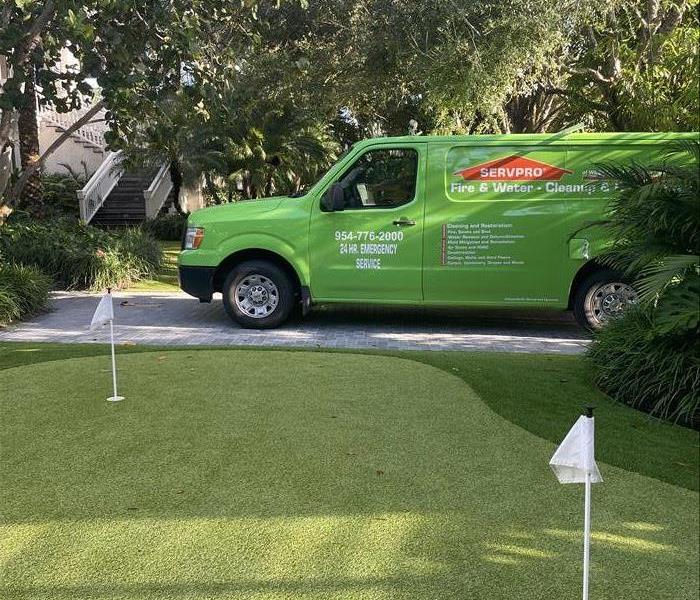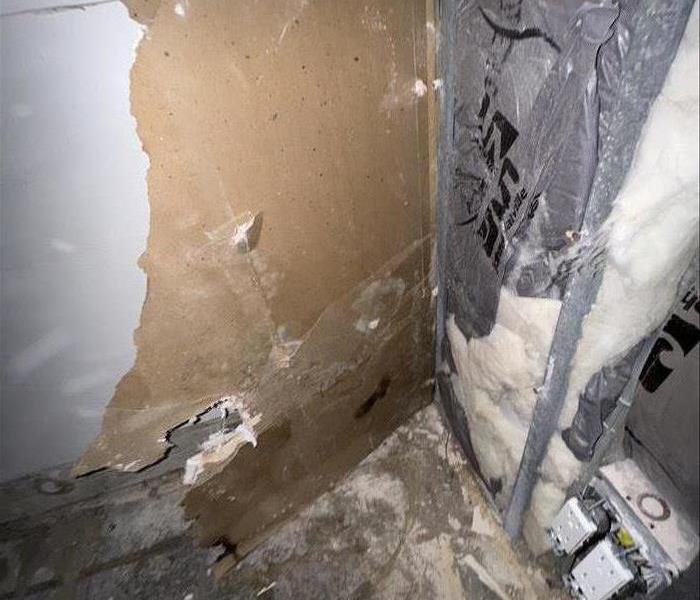Recent Posts
Restoring Memories: How to Clean and Salvage Fire-Damaged Documents and Photos
12/12/2024 (Permalink)
When a fire strikes, the immediate focus is often on restoring structural damage, but personal belongings like documents and photos are equally important. These items, filled with memories or essential information, can suffer severe damage from flames, heat, smoke, and even water used to extinguish the fire. Fortunately, with the right techniques and professional assistance, many of these items can be salvaged.
Assessing the Damage
The first step in restoring fire-damaged documents and photos is to assess the extent of the damage. Fire can cause burns, scorching, soot deposits, and warping due to heat exposure. Water damage from firefighting efforts may also leave papers and photos soaked, which can lead to warping, smudging, or even mold growth. In these situations, it's important to handle the items carefully. Any additional mishandling could cause irreversible damage.
Immediate Actions to Take
Time is of the essence when it comes to restoring important documents and photos. Quick action can prevent further degradation. Here are a few things you can do:
- Separate Wet Items: Carefully separate wet documents and photos from each other to prevent them from sticking together. Use a flat surface to lay them out and avoid touching the inked parts of photographs.
- Air Dry: One of the safest methods for drying fire-damaged paper and photos is to air dry them naturally. Place them in a room with good air circulation but away from direct sunlight, as heat may cause additional warping or fading.
- Freezing for Later Restoration: If immediate restoration isn't possible, you can freeze documents and photos to prevent mold growth and further damage. Freezing can also stop the ink from bleeding and the paper from curling.
Professional Restoration Techniques
For delicate or severely damaged items, professional restoration services like SERVPRO® can be invaluable. SERVPRO uses advanced techniques to clean and restore important items, such as:
- Vacuum Freeze-Drying: This is an advanced method used to remove moisture from water-damaged documents and photos without causing further harm. The technique is performed in a vacuum chamber where frozen moisture is vaporized directly from the solid state, avoiding additional warping or smudging.
- Deodorization: Documents and photos exposed to smoke can retain unpleasant odors. SERVPRO utilizes specialized deodorization techniques, such as ozone treatments, to remove any lingering smoke smell from paper and photographic materials.
- Soot and Stain Removal: Professionals are trained in the careful cleaning of soot and smoke residue from paper and photos, ensuring that they do not get smudged or damaged further during the cleaning process.
Why Choose Professional Restoration Services?
Handling fire-damaged documents and photos is a delicate process that requires specialized equipment and expertise. Attempting to clean soot or dry waterlogged photos without the proper techniques may result in more damage than restoration. SERVPRO of Punta Gorda professionals have the experience and tools to safely restore these important items.
In the aftermath of a fire, restoring personal belongings like documents and photos can provide much-needed comfort. While some items may not be fully restored to their original state, professional services give you the best chance at preserving irreplaceable memories. For expert assistance in fire damage recovery, including document and photo restoration, SERVPRO is here to help you recover what matters most.
??Mold Prevention Tips for Tenants: How to Keep Your Rental Mold-Free
11/14/2024 (Permalink)
Mold growth in rental properties is a common concern, especially in areas with high humidity or frequent water exposure. As a tenant, it’s essential to take proactive steps to prevent mold from becoming an issue in your home. Not only can mold cause damage to your belongings, but it can also lead to disputes between tenants and landlords over responsibility for its removal. Luckily, there are several simple ways to reduce the risk of mold growth in your rental property.
Here are some practical mold prevention tips for tenants to keep your living space mold-free, along with advice on when to call SERVPRO of Punta Gorda for professional mold remediation services.
Control Indoor Humidity
Mold thrives in damp environments, making humidity control a key factor in preventing mold growth. Keep indoor humidity levels below 50%, and use a dehumidifier in areas prone to moisture, such as bathrooms, kitchens, and basements. Regularly checking your home's humidity levels can help you take action before mold has a chance to grow.
Ventilate Your Home Properly
Proper ventilation is crucial in preventing mold buildup. Use exhaust fans when cooking or showering to remove excess moisture from the air. If your rental property doesn’t have an exhaust fan, open windows to allow fresh air to circulate and reduce moisture. Proper ventilation helps keep moisture levels in check and prevents condensation from building up on walls and surfaces.
Fix Leaks Immediately
One of the primary causes of mold growth is moisture from leaks. Report any plumbing leaks, roof leaks, or drainage issues to your landlord as soon as you notice them. The longer these issues go unresolved, the greater the likelihood of mold development. Be proactive in identifying and fixing small leaks in sinks, toilets, or showerheads, as even minor water exposure can lead to mold growth over time.
Dry Wet Areas Promptly
Whether it's a spill on the floor or a wet towel left in the bathroom, make sure to dry wet areas immediately. Mold can start growing within 24-48 hours of exposure to moisture, so quick action is crucial. For example, after taking a shower, wipe down tiles and walls to prevent excess moisture from lingering in the bathroom.
Keep Your Rental Clean
Dust and dirt can provide a food source for mold, making regular cleaning essential in mold prevention. Clean surfaces frequently and vacuum carpets with a HEPA filter to reduce the number of airborne mold spores. Regularly cleaning bathrooms, kitchens, and other moisture-prone areas can help keep mold at bay.
Monitor Your Indoor Plants
While indoor plants can improve air quality, they can also create a mold-friendly environment if overwatered. Mold can grow in the soil of potted plants, so be careful not to water them excessively. Placing plants in well-ventilated areas and avoiding water buildup in pots can help prevent mold.
Check for Mold in Hidden Areas
Mold can grow in hidden areas such as behind furniture, in closets, or under carpets. Periodically check these areas for signs of mold, especially if they are near windows or in damp rooms. Mold may not always be visible, so pay attention to musty odors as a sign that mold could be developing.
When to Call SERVPRO®
Despite your best efforts, mold can sometimes still become an issue. If you discover significant mold growth in your rental property, contact SERVPRO for professional mold remediation. SERVPRO’s trained technicians will assess the situation, identify the source of the moisture, and remove mold safely and effectively. This ensures that your living environment is thoroughly cleaned and mold-free.
By following these mold prevention tips, you can reduce the risk of mold growth in your rental property and maintain a clean, safe living environment. However, if mold becomes a problem, don’t hesitate to reach out to SERVPRO for expert mold remediation services.
Common Mistakes Homeowners Make That Lead to Water Damage
10/16/2024 (Permalink)
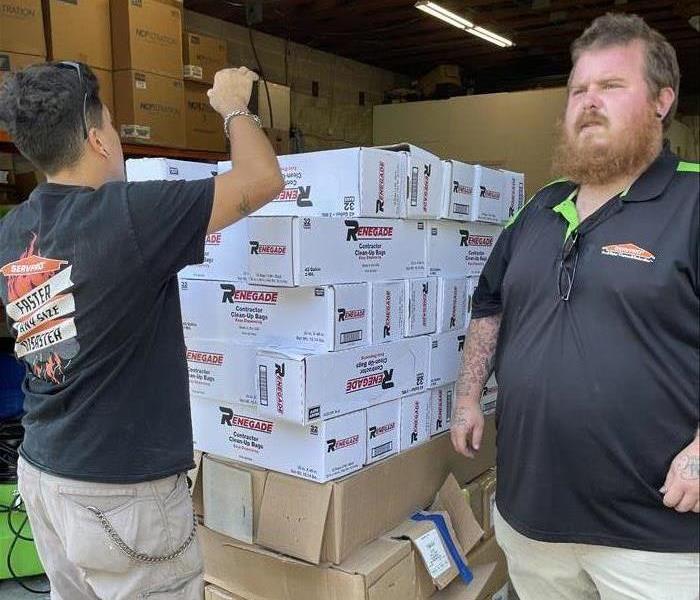 Remember, being proactive today can save you from extensive damage and costly repairs tomorrow.
Remember, being proactive today can save you from extensive damage and costly repairs tomorrow.
Water damage is one of the most common issues homeowners face, and unfortunately, it often results from preventable mistakes. At SERVPRO®, we have seen firsthand how small oversights can lead to costly and extensive repairs. By being aware of these common mistakes, you can take proactive steps to protect your home from water damage.
Ignoring Minor Leaks
One of the most common mistakes homeowners make is ignoring small leaks. Whether it’s a dripping faucet, a minor roof leak, or a tiny crack in a pipe, these issues are often dismissed as insignificant. However, what starts as a minor leak can quickly escalate into a major problem. Water that continually seeps into your home can cause structural damage, encourage mold growth, and ruin your belongings. The best approach is to address leaks as soon as they’re noticed. Regular inspections of your plumbing, roof, and other vulnerable areas can help you catch leaks early and prevent more severe water damage.
Poor Drainage Around the Home
Another common mistake is neglecting proper drainage around the home. Poor drainage systems, such as clogged gutters or improperly sloped landscaping, can cause water to accumulate around your foundation. Over time, this can lead to basement flooding, foundation cracks, and significant water damage inside your home. To avoid this, ensure that your gutters and downspouts are clean and direct water away from your house. Additionally, consider grading your yard to slope away from the foundation, which will help keep excess water at bay.
Mismanaging Appliance Maintenance
Home appliances, particularly those that use water, are often a source of water damage when not properly maintained. Washing machines, dishwashers, water heaters, and refrigerators can develop leaks due to worn-out hoses, faulty seals, or general wear and tear. Homeowners often overlook regular maintenance of these appliances, leading to unexpected water damage. It’s essential to routinely inspect these appliances for signs of wear and tear and replace any damaged components promptly. Installing a water leak detection system can also provide an added layer of protection by alerting you to potential leaks before they become significant issues.
Delaying Roof Repairs
The roof is your home’s first line of defense against water damage, but many homeowners delay repairs when they notice issues like missing shingles, damaged flashing, or deteriorating seals around vents and chimneys. Ignoring these problems can lead to significant water intrusion during storms, causing damage to your attic, walls, ceilings, and even the structure of your home. Regular roof inspections, especially after severe weather, and timely repairs can prevent water from finding its way into your home.
Water damage can be costly and disruptive, but by avoiding these common mistakes, homeowners can significantly reduce their risk. Regular maintenance, prompt repairs, and proper home management are key to keeping your home safe and dry. At SERVPRO®, we’re here to help® you prevent water damage and assist with restoration if the unexpected happens. Remember, being proactive today can save you from extensive damage and costly repairs tomorrow.
Stay Alert: Navigating Weather Alerts and Emergency Notifications
9/11/2024 (Permalink)
The Southeast United States is frequently affected by severe weather, including hurricanes, tropical storms, tornadoes, and severe thunderstorms. Staying informed through weather alerts and emergency notifications is essential for ensuring the safety of you and your family. In this blog, we'll explore the various types of weather alerts, how to receive them, and tips for staying informed during severe weather events in Punta Gorda, Florida.
Understanding Weather Alerts
- Watches and Warnings: Know the difference between a watch and a warning. A watch means that conditions are favorable for severe weather, while a warning means that severe weather is imminent or already occurring.
- Advisories: Weather advisories inform the public about less severe weather events that could still cause significant inconvenience or hazard.
Types of Weather Alerts
- Severe Thunderstorm Warnings: Issued when severe thunderstorms are occurring or imminent, characterized by strong winds, hail, and heavy rain.
- Tornado Warnings: Issued when a tornado has been sighted or indicated by weather radar. Take immediate shelter.
- Hurricane Watches and Warnings: Watches indicate the possibility of hurricane conditions within 48 hours, while warnings indicate that hurricane conditions are expected within 36 hours.
- Flash Flood Warnings: Issued when rapid flooding is occurring or imminent. Move to higher ground immediately.
- Heat Advisories and Excessive Heat Warnings: Issued during extreme heat events to alert the public of health risks.
Receiving Weather Alerts
- Emergency Alert System (EAS): EAS broadcasts emergency alerts via television and radio. Keep a battery-powered radio on hand to receive alerts during power outages.
- Wireless Emergency Alerts (WEA): WEA messages are sent to your mobile phone during emergencies, such as severe weather, AMBER alerts, and presidential alerts.
- NOAA Weather Radio: A NOAA Weather Radio provides continuous weather information and emergency alerts directly from the National Weather Service. Choose a model with battery backup.
- Weather Apps: Install reliable weather apps on your smartphone. Apps like The Weather Channel, AccuWeather, and NOAA Weather Radar Live provide real-time alerts and updates.
- Local News: Local television and radio stations provide timely updates and emergency notifications. Follow your local news stations on social media for instant alerts.
Staying Informed During Severe Weather
- Multiple Sources: Rely on multiple sources for weather information to ensure you receive timely and accurate updates.
- Follow Official Channels: Follow local and national weather agencies, such as the National Weather Service (NWS) and the Federal Emergency Management Agency (FEMA), on social media.
- Community Alerts: Sign up for community alert systems offered by your local government or emergency management agency. These systems send notifications about severe weather, evacuations, and other emergencies.
- Stay Updated: Continuously monitor weather conditions and updates during a severe weather event. Weather can change rapidly, and staying informed can save lives.
Preparing for Severe Weather
- Emergency Kit: Keep an emergency kit stocked with essentials like water, non-perishable food, flashlights, batteries, a first aid kit, and important documents.
- Family Communication Plan: Develop a family communication plan that includes a meeting place and emergency contacts. Ensure all family members know the plan.
- Shelter Plan: Identify safe shelter locations in your home for different types of severe weather, such as a basement for tornadoes or an interior room for hurricanes.
- Evacuation Plan: Know your evacuation routes and have a plan for where to go if you need to leave your home.
Staying informed through weather alerts and emergency notifications is crucial for protecting yourself and your loved ones during severe weather events in the Southeast. Utilize multiple sources of information, follow official channels, and prepare in advance to ensure you can respond quickly and effectively when severe weather strikes. By staying informed and prepared, you can minimize the impact of severe weather and keep your family safe. Contact SERVPRO of Punta Gorda for your emergency storm restoration cleanup services after a storm.
Preserving Memories: Restoring Fire-Damaged Artwork and Collectibles
8/13/2024 (Permalink)
A fire in your home or business can cause devastating damage, particularly to cherished artwork and valuable collectibles. These items often hold not only monetary value but also significant sentimental importance. Restoring fire-damaged artwork and collectibles requires specialized knowledge and techniques to ensure their preservation. In this blog, we will explore the challenges of restoring these treasured items and how professional services, like those provided by SERVPRO®, can help in bringing them back to life.
The Challenges of Fire-Damaged Artwork and Collectibles
- Smoke and Soot Damage: Smoke and soot can deeply penetrate porous surfaces, leaving behind residues that can discolor and deteriorate artwork and collectibles. These particles can be acidic, leading to further damage over time.
- Heat Damage: High temperatures can cause warping, melting, or blistering of materials such as paper, canvas, wood, and various types of collectibles. Heat can also alter the chemical composition of certain materials, making restoration more complex.
- Water Damage: The water used to extinguish the fire can cause additional harm, including mold growth, warping, and swelling of materials. Water can also cause colors to run or fade, particularly in artworks created with water-soluble media.
- Chemical Residues: Fires can produce a variety of chemical residues from burning materials, which can settle on artwork and collectibles. These residues may require specialized cleaning techniques to safely remove.
The Importance of Professional Restoration
- Expert Assessment: Professional restorers can accurately assess the extent of damage to your artwork and collectibles. They understand the specific needs of different materials and can determine the best course of action for each item.
- Specialized Techniques: Restoring fire-damaged artwork and collectibles often requires advanced techniques and tools. Professionals use methods such as dry cleaning, wet cleaning, ultrasonic cleaning, and deacidification to safely remove soot, smoke, and other contaminants.
- Preventing Further Damage: Improper cleaning and handling can exacerbate the damage to your items. Professional restorers know how to handle delicate items carefully and use appropriate methods to prevent further harm.
- Conservation and Preservation: Beyond immediate restoration, professionals can provide conservation services to protect and preserve your artwork and collectibles for the future. This includes applying protective coatings, repairing frames, and advising on optimal storage conditions.
SERVPRO’s Expertise in Restoring Artwork and Collectibles
SERVPRO offers a full range of restoration services for fire-damaged properties, including specialized care for artwork and collectibles. Their team is trained to handle delicate and valuable items with the utmost care. We utilize advanced equipment and techniques to restore damaged items. This includes HEPA vacuums, ultrasonic cleaning machines, and specialized drying chambers designed to handle delicate materials. For particularly valuable or complex restorations, we collaborate with art conservators and other specialists who have specific expertise in restoring fine art and collectibles. This ensures the highest level of care and precision.
Professional restoration services, like those offered by SERVPRO of Punta Gorda, provide the expertise, equipment, and care necessary to restore your cherished possessions. If your artwork or collectibles have beecn damaged by fire, trust us to help bring them back to life, preserving both their value and the memories they hold.
Foundation Cracks and Water Infiltration: Causes and Fixes
6/12/2024 (Permalink)
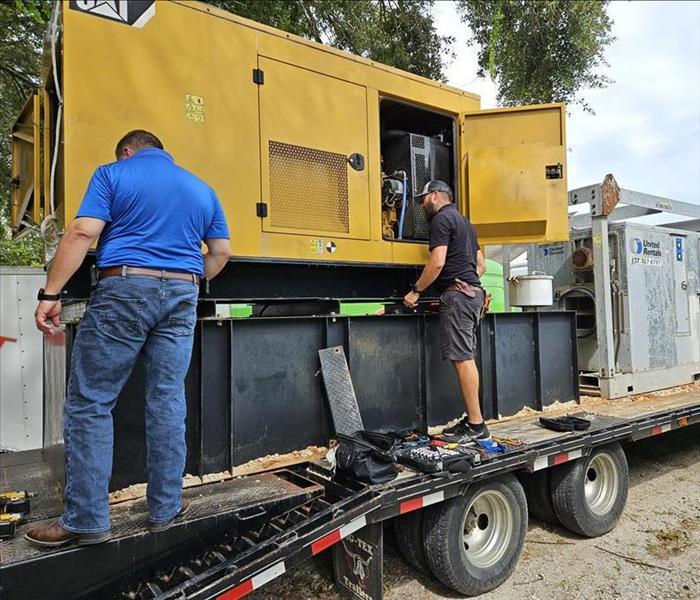 We will explore the common causes of foundation cracks and provide helpful fixes to address water infiltration issues.
We will explore the common causes of foundation cracks and provide helpful fixes to address water infiltration issues.
The foundation of your home is not only vital for its structural integrity but also for protecting it from water infiltration. However, foundation cracks can compromise this protective barrier, allowing water to seep in and cause significant damage. Understanding the causes and finding effective solutions for foundation cracks and water infiltration is crucial to preserving the health of your home. Here, we will explore the common causes of foundation cracks and provide helpful fixes to address water infiltration issues.
Causes of Foundation Cracks
- Soil Settlement: Over time, the soil beneath your foundation can settle, leading to uneven pressure and causing cracks to develop.
- Poor Drainage: Improper or inadequate drainage around your home can result in water pooling around the foundation. This constant exposure to moisture can weaken the foundation and lead to cracks.
- Hydrostatic Pressure: Excessive water pressure from saturated soil can push against the foundation walls, causing them to crack under the strain.
- Temperature Changes: Extreme temperature fluctuations can cause the foundation to expand and contract, leading to cracks.
Fixes for Foundation Cracks and Water Infiltration
- Evaluate Drainage System: Ensure that your home's drainage system is properly designed and functioning effectively. Clear gutters and downspouts regularly to prevent water overflow. Consider grading the soil around your foundation to direct water away from the house.
- Install a Sump Pump: A sump pump can be an effective solution to manage water intrusion. It collects excess water and pumps it away from the foundation, minimizing the risk of water infiltration through cracks.
- Seal Foundation Cracks: Smaller cracks can be sealed using epoxy or polyurethane-based sealants. These sealants fill the cracks and prevent water from entering your home. However, it's essential to note that this is a temporary fix and may not be suitable for larger or more severe cracks.
- Professional Foundation Repair: For significant or recurring foundation cracks, it's advisable to consult with a professional foundation repair service like SERVPRO®. They can assess the extent of the damage, determine the underlying cause, and recommend appropriate solutions. Professional repairs may involve techniques such as concrete underpinning, carbon fiber reinforcement, or helical piers to stabilize the foundation and prevent further cracking.
- Maintain Consistent Moisture Levels: Keep the soil around your foundation consistently moist to reduce the risk of shrinking and expanding, which can cause foundation cracks. Avoid overwatering or allowing the soil to dry out completely.
- Monitor and Address Minor Cracks: Regularly inspect your foundation for any signs of cracking or water infiltration. Promptly address minor cracks by sealing them to prevent further water damage and potential structural issues.
- Landscaping Considerations: Plant trees and shrubs away from the foundation, as their root systems can grow and exert pressure on the foundation walls, leading to cracks. Additionally, avoid overwatering landscaping near the foundation.
Foundation cracks and water infiltration can be a serious concern for homeowners. By understanding the causes and implementing effective fixes, you can protect your home from water damage and preserve its structural integrity. Remember to evaluate drainage systems, seal cracks, and consult with professionals for more extensive repairs. By taking proactive steps and working with trusted experts like SERVPRO, you can ensure the long-term health of your foundation and overall home. Act promptly, address issues as they arise, and safeguard your home against potential water infiltration and its damaging effects.
Emergency Response Planning for Florida Storms: Creating a Checklist
5/15/2024 (Permalink)
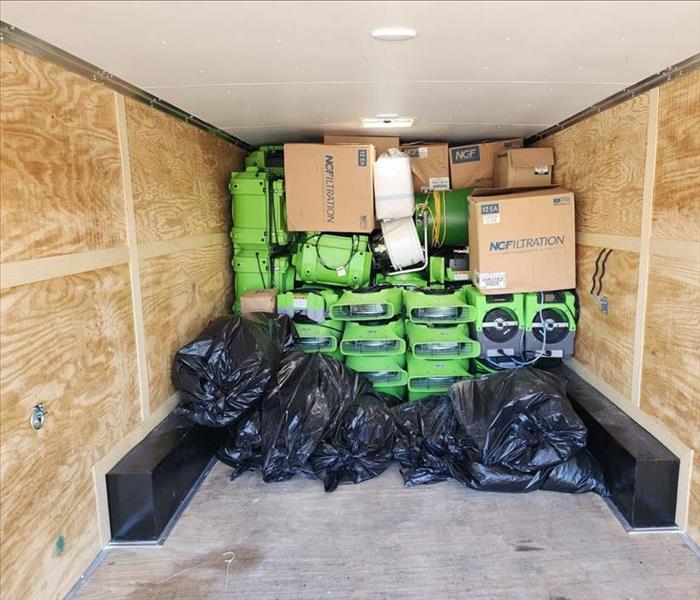 In this blog, we will explore key steps and considerations for emergency response planning specific to Florida storms.
In this blog, we will explore key steps and considerations for emergency response planning specific to Florida storms.
Living in Florida, it is important to be well-prepared for the potential impact of severe storms and hurricanes. By creating an emergency response plan and checklist, you can ensure the safety of yourself, your family, and your property. In this blog, we will explore key steps and considerations for emergency response planning specific to Florida storms.
Stay Informed
The first step in emergency response planning is to stay informed about potential storms and weather conditions. Sign up for local weather alerts and notifications to receive timely information about approaching storms. Stay informed about evacuation orders, road closures, and emergency shelters in your area.
Create a Communication Plan
Establish a communication plan with your family or household members. Designate a central contact person who will be responsible for gathering and disseminating information. Share emergency contact numbers and establish meeting points in case you are separated during the storm. Consider using phone apps or group messaging apps to stay connected.
Prepare an Emergency Kit
Assemble an emergency kit that includes essential items for you and your family. Include items such as non-perishable food, drinking water, flashlights, batteries, a first aid kit, medications, important documents, cash, and personal hygiene items. Keep the kit in a readily accessible location and ensure that it is regularly updated.
Evacuation Planning
If your area is under an evacuation order, plan your evacuation route in advance. Identify multiple routes to your designated evacuation site, considering alternative routes in case of road closures or congestion. Pack necessary items such as clothing, important documents, and supplies you might need during your evacuation.
Secure Your Property
Protecting your property should be a priority in your emergency response plan. Secure loose outdoor items, such as patio furniture or garden tools, that could become projectiles in high winds. Consider installing hurricane shutters or boarding up windows and doors to protect against flying debris. Trim tree branches that pose a threat to your property or power lines.
Review Insurance Coverage
Review your insurance coverage to ensure you have adequate protection for storm-related damages. Consider adding coverage for flood or wind damages if necessary. Familiarize yourself with the claims process and understand what documentation will be required to file a claim.
Backup Important Data
Create a backup of important data and documents, such as insurance policies, identification cards, and financial records. Store them in a secure location, including cloud storage or a portable hard drive, to ensure you can access them even if your primary copies are damaged or inaccessible.
Stay Connected to SERVPRO®
Establish a connection with a professional storm damage restoration company like SERVPRO. Prior to the storm, save the contact information of your local SERVPRO office. They can provide essential services such as water damage restoration, mold remediation, and structural repairs after a storm. Having a trusted restoration partner in your emergency response plan can help streamline the recovery process.
By following these steps and creating an emergency response checklist, you can be well-prepared for Florida storms. Remember to review and update your plan regularly to ensure its effectiveness. Stay vigilant, stay informed, and seek professional assistance when necessary. Together, we can navigate Florida storms with preparedness and resilience.
The Different Types of Mold Commonly Found in Homes
5/13/2024 (Permalink)
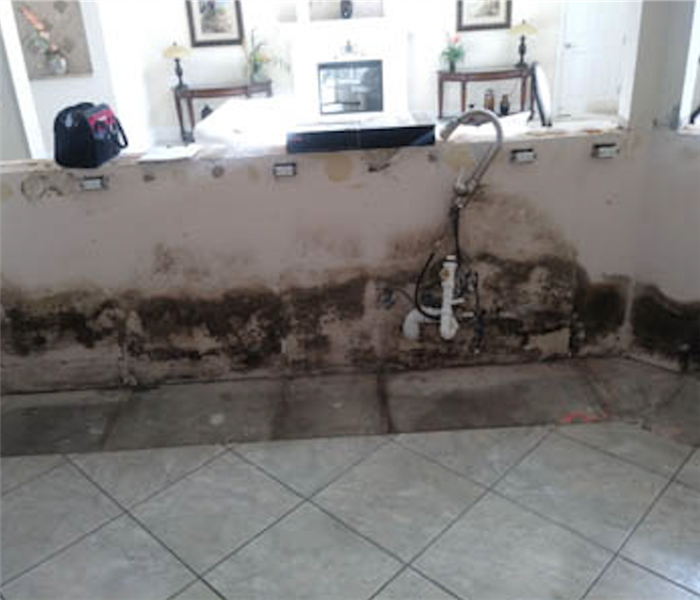 By understanding the different types of mold that can be found in homes, homeowners can take appropriate measures to prevent mold growth.
By understanding the different types of mold that can be found in homes, homeowners can take appropriate measures to prevent mold growth.
Mold is a common issue in many homes, and different types of mold can thrive in various environments. Identifying the specific type of mold in your home is essential for effective remediation. Here's a closer look at some common types of mold:
Cladosporium
Cladosporium is a widespread type of mold that can appear as dark green or black spots on surfaces. It often grows on organic materials like wood, textiles, and plant debris. Cladosporium mold can thrive in both indoor and outdoor environments, particularly in areas with high humidity levels. While it's not typically considered harmful, large concentrations of Cladosporium mold can cause staining and structural damage to building materials.
Aspergillus
Aspergillus is a genus of mold that includes numerous species commonly found indoors and outdoors. It can appear in various colors, including green, yellow, and brown. Aspergillus mold typically grows on organic materials like soil, compost, and decaying vegetation. While most species of Aspergillus are harmless, some can produce allergens and irritants.
Stachybotrys
Stachybotrys, often referred to as black mold due to its dark appearance, is a fungus that flourishes in areas with high moisture levels and water damage. Its characteristic slimy black spots can frequently be observed on surfaces such as drywall, ceiling tiles, and wood.
Penicillium
Penicillium is a genus of mold that includes over 200 different species, some of which are commonly found indoors. It can appear as blue or green fuzzy spots on surfaces and often grows on materials like wallpaper, carpeting, and upholstered furniture. While Penicillium mold is known for its role in producing antibiotics and cheese, certain species can produce mycotoxins.
Alternaria
Alternaria is a type of mold commonly found in indoor and outdoor environments. It appears as dark green or black spots on surfaces and is often associated with water damage and damp conditions. Alternaria mold can grow on a variety of materials, including walls, ceilings, and window sills.
By understanding the different types of mold that can be found in homes, homeowners can take appropriate measures to prevent mold growth and address any existing issues effectively. Regular inspection and maintenance of your home's interior and exterior can help reduce the risk of mold infestations and maintain a healthy indoor environment. If you suspect mold growth in your home, consider consulting a professional mold remediation specialist, such as SERVPRO of Punta Gorda, for assistance.
Restoring Fire-Damaged Chimneys and Fireplaces
4/17/2024 (Permalink)
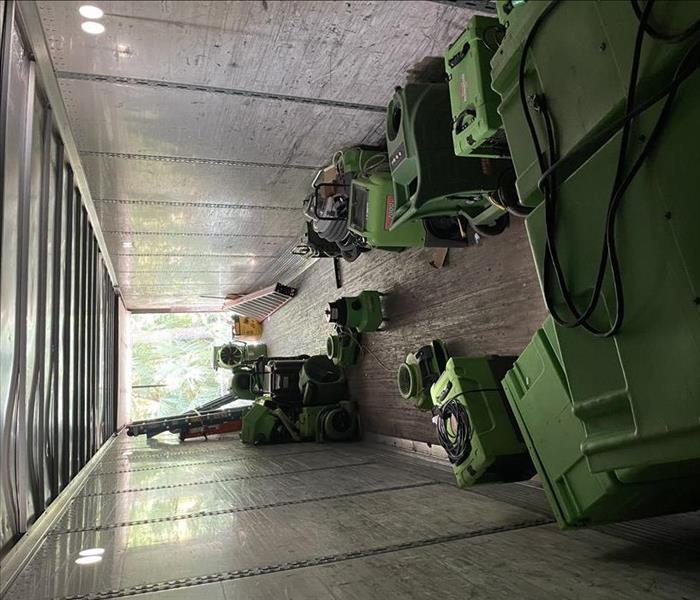 In this blog, we will discuss the importance of restoring fire-damaged chimneys and fireplaces.
In this blog, we will discuss the importance of restoring fire-damaged chimneys and fireplaces.
Chimneys and fireplaces are essential components of many homes, providing warmth, ambiance, and comfort. However, when a fire occurs, these features can sustain extensive damage, both visible and hidden, which can lead to significant structural problems if not addressed. In this blog, we will discuss the importance of restoring fire-damaged chimneys and fireplaces, and the steps necessary to ensure safe and efficient restoration with the help of professional fire damage restoration and remediation services, such as SERVPRO®.
Conduct a Thorough Inspection
After a fire, it is essential to have a licensed professional inspect your chimney and fireplace for damage. Professional technicians will assess both the visible and hidden damage, such as the condition of the masonry, flue liner, and internal components of the chimney. A thorough inspection allows a restoration plan to be developed, ensuring that all necessary repairs are identified and completed.
Remove Debris and Soot
Fire damage restoration and remediation services will start the restoration process by removing debris and soot from the chimney and fireplace. This process includes cleaning the visible surfaces, such as the flue liner and chimney cap, as well as the internal components of the chimney. Advanced cleaning technologies and techniques, including dry ice blasting and chemical sponges, are utilized to ensure all debris and soot are removed safely and efficiently.
Address Structural Damage
Structural damage to the chimney and fireplace caused by a fire can be significant. Loose bricks, cracks in the masonry, and other damage can pose a severe safety risk if not addressed. Fire damage restoration and remediation services ensure that all structural damage is identified and repaired promptly to maintain the safety and structural integrity of the chimney and fireplace.
Repair Internal Components
The internal components of a chimney, including the flue liner and damper, can be damaged severely by a fire. If left unaddressed, the structural integrity of the chimney can be compromised, and gases, including carbon monoxide, can enter the home. Professional fire damage restoration and remediation services will identify and repair any damaged components, ensuring the safe operation of the chimney and fireplace.
Rebuild and Reinstall
In severe cases of chimney and fireplace damage, rebuilding and reinstalling may be necessary. Professional restoration technicians will work with you to determine the best course of action to restore your chimney and fireplace to its pre-fire condition. Restoration and rebuilding efforts will include the construction of a new flue liner, the installation of new components, and the rebuilding of the chimney's masonry.
Fire Prevention Measures
To prevent future fires, professional restoration services will make recommendations on fire prevention measures, such as cleaning the chimney regularly, inspecting the fireplace before use, and using appropriate firewood. Implementing these recommendations will help maintain the safety and longevity of your chimney and fireplace.
Chimneys and fireplaces are not only aesthetically pleasing but also essential components of homes. Restoring fire-damaged chimneys and fireplaces is crucial to maintaining their safety, longevity, and aesthetic appeal. Professional restoration and remediation services provided by SERVPRO will ensure the safe and efficient restoration of your chimney and fireplace following a fire. The necessary steps, including a thorough inspection, removing debris and soot, addressing structural and internal damage, rebuilding and reinstalling, and implementing fire prevention measures, ensure the success of the restoration process. Contact a professional fire damage restoration and remediation service promptly to restore your fire-damaged chimney and fireplace to its pre-fire condition.
How to Properly Ventilate Your Home to Prevent Mold
3/13/2024 (Permalink)
Welcome to SERVPRO®, where we are committed to providing valuable insights to help you maintain a safe and healthy living environment. In this post, we'll be discussing a crucial aspect of home maintenance – proper ventilation to prevent mold growth. Mold can be a persistent problem in homes, especially in areas with high humidity levels. However, with the right ventilation strategies, you can create an environment that discourages mold growth and keeps your home fresh and clean.
Understanding the Importance of Ventilation
Effective ventilation is key to maintaining optimal indoor air quality. Poor ventilation can lead to a buildup of moisture, providing the perfect breeding ground for mold. By allowing fresh air to circulate throughout your home, you can reduce humidity levels and inhibit mold growth. Now that we know its importance, let's look at some practical tips to help you properly ventilate your home.
Use Exhaust Fans
Install and regularly use exhaust fans in high-moisture areas such as bathrooms, kitchens, and laundry rooms. These fans help remove excess humidity generated by activities like cooking and showering, preventing moisture from accumulating.
Open Windows and Doors
Whenever weather permits, open windows and doors to allow cross-ventilation. This helps create a continuous flow of fresh air throughout your home, reducing indoor humidity levels and minimizing the risk of mold growth.
Check and Clean HVAC Systems
Regularly inspect and clean your heating, ventilation, and air conditioning (HVAC) systems. Dirty or clogged filters can impede airflow and trap moisture, creating an environment conducive to mold. Change filters as recommended by the manufacturer to ensure optimal performance.
Invest in a Dehumidifier
Consider using a dehumidifier in areas prone to high humidity, such as basements or crawl spaces. Dehumidifiers can effectively remove excess moisture from the air, making it more challenging for mold to thrive.
Sal Leaks and Gaps
Inspect your home for any leaks or gaps that could allow moisture to enter. Seal these areas promptly to prevent water intrusion and maintain a dry indoor environment.
Proper ventilation is a key factor in preventing mold growth in your home. By following these practical tips, you can create an environment that discourages mold, promotes healthy indoor air quality, and ensures the longevity of your property. If you encounter mold issues despite your best efforts, don't hesitate to contact SERVPRO for professional mold remediation services. Remember, a well-ventilated home is a happy home!




 24/7 Emergency Service
24/7 Emergency Service
